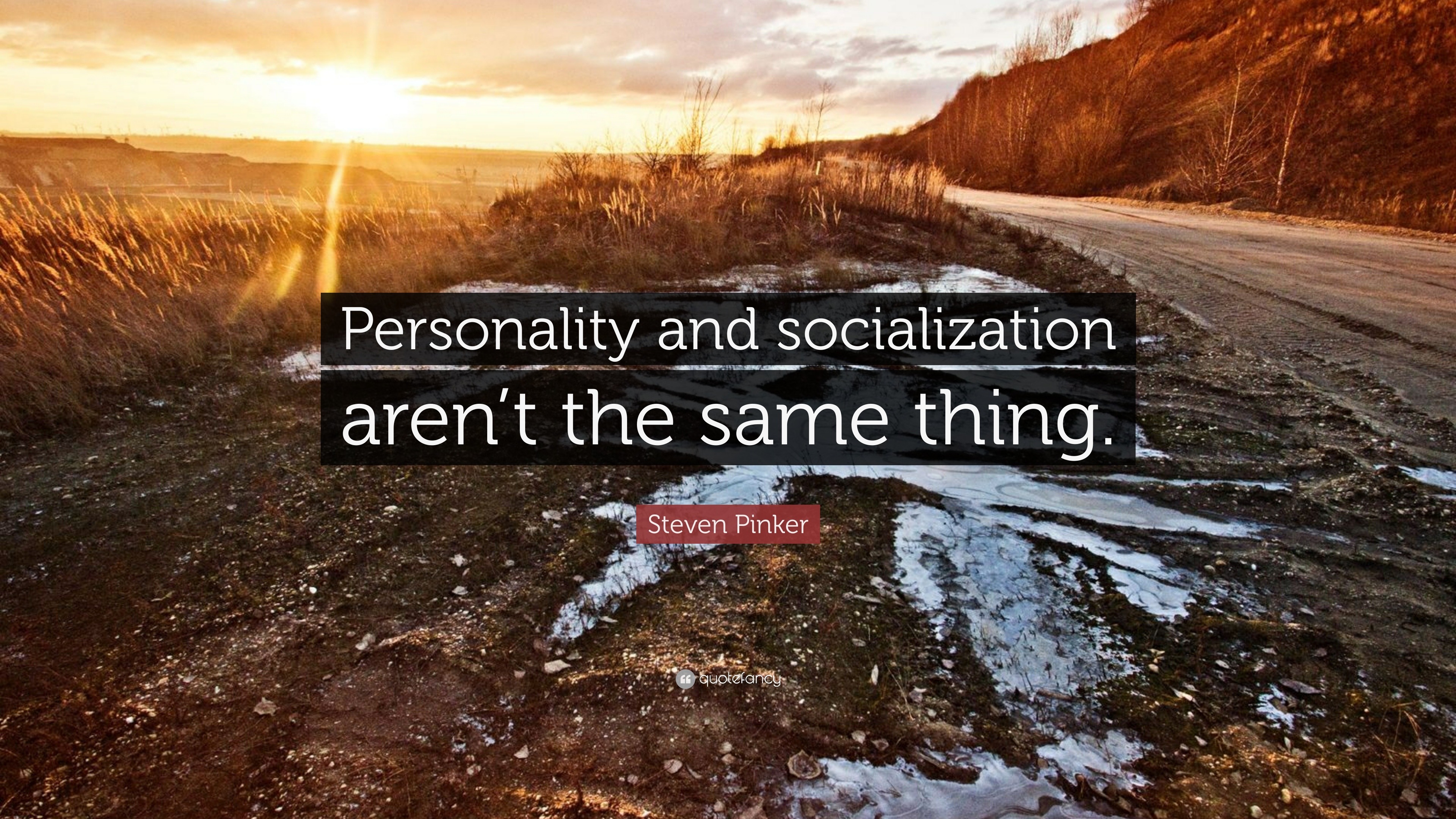Socialization
Culture gives the opportunity to develop a personality. Every society gives the pieces of training to its members in accordance with cultural practices. Human being learns from society. The personality of an individual depends on culture. According to MacIver, "Socialization is the process by which social beings establish wider and more profound relationships with one another, in which they become more bound up with, and more perceptive personality of themselves and of others and build up the complex structure of nearer and wider associations".
In fact, socialization is a subject of learning, society provides the space to enhance the capacity of the people. They became a social person through the socialization processes. In society, individual learn their behavior through the interaction process. The society provides certain roles and responsibilities as per age, gender, capacity and social position. The original nature of the human being acquired from society. To adjust to society, an individual need to adopt social environment. The socialization process enhances the maturation of the people. It plays significant roles in the transmission of culture from one generation to another, where they learn different types of rules and regulations.
Definitions
"Process of working together, of developing group responsibility, of being guided by the welfare needs of others". - Bogarts
"Socialization consists of the "complex processes of interaction through which individual learn the habits, skills, beliefs, and standards of judgment that are necessary for his effective participation in social group and communities". - Lundberg

Types of Socialization
Socialization is a life-long process; it has been continued since childhood to adult age. There are various types of socialization.
- Primary socialization: The socialization process of the infant stage is known as primary socialization. The infant stage children learn to communicate or learn the language. It is a basic socialization process. It takes early years of life. Children learn cognitive skills and they have close interaction with culture. Children could not distinguish right and wrong, moral and immoral. They also learn language, attitudes, norms, and values.
- Secondary Socialization: The secondary process of socialization can be seen outside the family- mainly with peer groups. They learn at school or beyond the family environment, where they received different kinds of social pieces of training and skills in different institutions. The mass media, school, office, and workplace play important roles for the socialization. This kind of socialization process also referred to as adult socialization. In this stage, men discard the old ways and accept new ideas, values, attitudes, views, and vision. In this stage, they have multiple choices and adopt the material life. An individual teaches people to take new duties and change the views of the individual and change overt behavior.
- Anticipatory Socialization: An individual who learn the culture of a group with the anticipation of joining that group. They learn different types of beliefs, norms, value and so on. This process of socialization shows that a man could not alone learn the culture of groups to which they are not a concern. For instance, they learn through the joining sports club, through the physical training and technical knowledge that build the sportsmanship. This kind of socialization may take place anytime and anyplace throughout their life.
- Re-socialization: Through this process, an individual discards their former behavior and accept the new culture. The social role is fundamentally changed. People received new position and status in the society and they also change the membership.
Personality and Socialization
The personality of human being depends on culture. The culture is constructed through the different types of shared beliefs, behaviors, arts, materials, attitudes, norms and values. The cultural components could be transmitted generation to generation. The personality of any individual would be a product of culture, their personality develops through the socialization process. The socialization process continues the process. People acquire their behavior, attitudes, arts, and artifacts through the process of interaction and adaptation.
Kimball Young argued that "personality consists of habits, attitudes, and ideas that are built up around both people and things".

Culture provides a specific space to build the personality of an individual. Through the socialization process an individual able to distinguish him/her from others. Culture provides the space to control or make the people be discipline. Individual exhibit their cultural traits as per their cultural background. Human habits like emotion, suspicion, aggressiveness, greedy, sentimental, and coyness are a product of the socialization process. Each culture develops special kinds of personality. An individual develops their personality through the different means and methods followed by certain cultural rules.
The cultural ideology, religious beliefs, tradition, and attitudes influence day-to-day life. The masculine and famine behavior does not necessarily depend on biological facts rather the influence of the culture, for instance, in Brahmin/ Chhetri women are mild, coy, shyness and emotional than the ethnic group's women in Nepal. Brahmin/Chhetri women have discriminated position, whereas ethnic group's women including Thakali, Sherpa, and Gurung are more open and they have a dominant role and equally contributed to give the financial decision in the everyday business. Ruth Benedict and Margaret Mead provided supportive ideas on how culture develops an individual personality. The nature of an individual determines through the socialization under the rules and regulations of the particular culture.
Adaptation
Adaptation is one of the most important issues in sociology, which maintains the social system or social structure; for example, a family should adopt social, economic and educational phenomena to maintain the familial system. Any social system like family, a state or organization needs to adopt its environment for existence or survive.
Adaptation is necessary for functional prerequisites. Every individual of the society needs to adopt a new social component for the proper adjustment. The adaptation process deals with the interdependence of the social parts of society. The term adaptation in sociology was influenced by the biology in the 19th century. The notion of the adaptation process is mainly for the social change and transformation of society.
Talcott Parson implies the notion of adaptation in the context of action; he states that “social system must cope with external boundary condition such as resources, physical condition, geographical phenomena”.
People solve economic problems through the process of adaptation. In Sociology, adaptation is taken as a major driving force of social change. Due to adaptation, simple hunting-gathering societies change into modern advance society. Adaptation process helps to understand the relationship between parts of society and system as a whole. The adaptation of new thing within the integral social systems changes the whole system. The environmental condition of the social forces the human being to adopt new technologies, new ideas, and even new customs and norms.
Co-operation
Co-operation is a continuous process in the society. In Co-operation two or more than two individuals work together to achieve the common goals. It's a form of interaction when different people interact together to attain common goals. Co-operation process maintains friendship, solidarity, and integrity within the people.
In Co-operation two or more than two people jointly carried out their work to fulfill their needs and expectation. Co-operation process often includes common goals and organized effort within the people. Cooperation helps to solve many problems which they face in their everyday life. In our everyday life, we can't alone solve our problems, thus we need co-operation of other people.

Co-operation is necessary that exist in dyadic form. There is close interaction and interdependent relationship between individuals through the Co-operation; for instance, to achieve a good result in the final exam there need to be Co-operation between professors and students. Both of them should work together for a better result. They must kindly support one another. The cooperating parties are either neutral or kindly dispose of one another.
Co-operation is necessary everywhere such as modern industrial sectors, school, companies, bureaucratic organizations, and large departmental stores. This is a conscious process where two or more individual consciously works together to complete their goals. They should continuously work in a collective way. This is a universal process which can be seen everywhere and every groups, societies, and nation. This is necessary for the progress of an individual as well as their society.
Types of Co-operation
Direct Co-operation: In the direct function an individual involved together i.e. play together, worship together and work together. People do in the company with other members of their concern work that may bring a final state of function in their day-to-day life.
Indirect Co-operation: In the indirect Co-operation where people work individually to attain common ends. In indirect Co-operation people have been worked in accordance with the division of labor, for example, CEO, manager, cashier, tailor, and computer engineer have different responsibility within the bank or financial institution; however, they work for the same end or they work for the financial service and benefit of their organization. In the indirect Co-operation, people have been worked as per their specialization.
Primary Co-operation: Primary Co-operation found in primary groups such as family, peer group, playgroup and friends. There is an identification of their goal where all of them work for the betterment. The reward of work would be equally shared among the members of society. They have one means and ends.
Secondary Co-operation: Secondary Co-operation can be seen in the modern capitalistic society which can be observed in the secondary groups. Every individual performed their activities in formal and specialized settings. Secondary Co-operation is individualistic and calculative. Each individual often works for his own benefit and wages. Member of the group shows some sort of loyalty towards the group. However there is no priority for the welfare of a group, they are separately performing their tasks for wages, salaries, promotion, status, and benefits. There is differentiation in their Co-operation and duties to meet their goal.
Tertiary Co-operation: In tertiary group two or more than two groups, parties, tribes, caste, religious groups work together for antagonistic goals. Two or more than two parties unite together to defeat their rival parties in the election or in parliament for the formation of a government.
Our other posts related to Sociology
Competition and Globalization: Meaning, Definition, and Characteristics
Other Online Resources
Socialization | Wikipedia
Myths about Socialization

Post a Comment